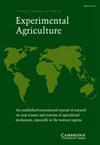Bioregulator application enhances yield by modulating antioxidant efficiency of rainfed cluster bean [Cyamopsis tetragonoloba L. (Taub.)] in the hot arid region of India
IF 1.9
4区 农林科学
Q1 Agricultural and Biological Sciences
引用次数: 0
Abstract
Summary Water deficiency is one of the most severe abiotic stresses in rainfed dry lands and limits crop productivity. Exogenous applications of salicylic acid (SA) have been applied to mitigate the adverse effects of water-deficit stresses, but the relative efficacy of different derivatives of SA in enhancing water-deficit tolerance along with the underlying physio-biochemical mechanism and yield of crops is not well documented. Field experiments were conducted to ascertain the relative efficacy of exogenous application of three plant bioregulators (PBRs) [SA, thiosalicylic acid and 5-sulfosalicylic acid (SSA)], each at three concentrations (0.5, 1.0 and 1.5 mM), on the growth, physio-biochemical characteristics and yield of cluster bean under rainfed conditions. Based on a 2-year field experiment, the application of PBRs enhanced yield (from 8 to 16%). The yield enhancement with the application of PBRs was associated with elevated water content (from 9 to 17%), membrane stability (from 12 to 18%) and antioxidant enzyme activity (from 12 to 33%) and reduced lipid peroxidation (from −15 to −34%) in leaves. The effects of PBRs were conditionally type and concentration dependent. The application of SSA at a rate of 1 mM was more effective in enhancing water-deficit tolerance and improving the yield of cluster bean under water shortage conditions. This study provides empirical evidence of the potential for the application of SA and its derivatives to enhance crop yields under drought conditions. The results have direct implications for sustainable crop production for similar regions of the world facing water deficits.在印度炎热干旱地区,生物调节剂通过调节雨养集束豆的抗氧化效率来提高产量[Cyamopsis tetragonoloba L. (Taub.)]
缺水是旱地旱地最严重的非生物胁迫之一,限制了作物产量。外源应用水杨酸(SA)已被用于减轻水分亏缺胁迫的不利影响,但不同水杨酸衍生物在提高作物水分亏缺耐受性以及潜在的生理生化机制和产量方面的相对功效尚未得到很好的研究。通过田间试验,确定3种植物生物调节剂[SA、硫代水杨酸和5-磺基水杨酸]在3种浓度(0.5、1.0和1.5 mM)下外源施用对雨养条件下集束豆生长、生理生化特性和产量的相对影响。经过2年的田间试验,pbr的施用提高了产量(从8%提高到16%)。施用PBRs可以提高叶片含水量(从9%提高到17%)、膜稳定性(从12%提高到18%)和抗氧化酶活性(从12%提高到33%),并降低脂质过氧化(从- 15%降低到- 34%)。pbr的作用是有条件的类型和浓度依赖的。在缺水条件下,施1 mM SSA能更有效地提高丛豆的耐亏水能力,提高产量。本研究为SA及其衍生物在干旱条件下提高作物产量的潜力提供了经验证据。研究结果对世界上面临缺水问题的类似地区的可持续作物生产具有直接影响。
本文章由计算机程序翻译,如有差异,请以英文原文为准。
求助全文
约1分钟内获得全文
求助全文
来源期刊

Experimental Agriculture
农林科学-农艺学
CiteScore
2.50
自引率
6.20%
发文量
29
审稿时长
24 months
期刊介绍:
With a focus on the tropical and sub-tropical regions of the world, Experimental Agriculture publishes the results of original research on field, plantation and herbage crops grown for food or feed, or for industrial purposes, and on farming systems, including livestock and people. It reports experimental work designed to explain how crops respond to the environment in biological and physical terms, and on the social and economic issues that may influence the uptake of the results of research by policy makers and farmers, including the role of institutions and partnerships in delivering impact. The journal also publishes accounts and critical discussions of new quantitative and qualitative methods in agricultural and ecosystems research, and of contemporary issues arising in countries where agricultural production needs to develop rapidly. There is a regular book review section and occasional, often invited, reviews of research.
 求助内容:
求助内容: 应助结果提醒方式:
应助结果提醒方式:


